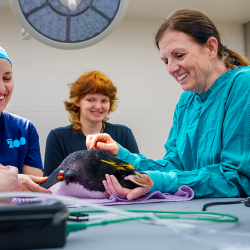Editor's Note: In Spring 2020, the Veterinary Technology Program’s name changed to the Veterinary Nursing Program.
Licensed veterinary technicians, also called veterinary nurses, are integral members of the veterinary healthcare team that have been educated in the care and handling of animals, the basic principles of normal and abnormal life processes, and in routine laboratory and clinical procedures.
The MSU College of Veterinary Medicine’s Veterinary Technology Program graduates are employed in private veterinary hospitals, shelter medicine, biomedical research, industry and government, as well as practice management roles and veterinary education.
Christine Trudeau (’16), Jennifer Ottney (’07), and Nicole Bone (’06), all alumni of the Program, have very different jobs. Read their stories below.
My Life as a Veterinary Nurse
Christine
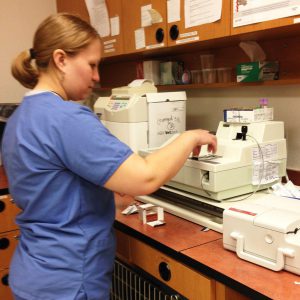
I am a laboratory technologist at MSU’s Veterinary Diagnostic Laboratory in the clinical pathology lab. The lab is divided into benches that each person is responsible for that day. So, one or two people can be in hematology running CBCs, one person is in chemistry—which also handles coagulation profiles—and then there’s the manuals bench, which includes urinalysis, blood gases, and fluid cytologies like peritoneal and synovial fluids and immunology-like cross matching and blood typing.
I also am responsible for completing some of the routine weekly and monthly maintenance on some of the analyzers and centrifuges. Everyone also helps with taking inventory, ordering samples, filing paperwork etc., all the little everyday chores that need to get done.
My favorite part of the lab is that it’s like a puzzle. All the different tests are pieces that come together to form a picture about a patient; then we get to play detective and figure out what those results mean. Then there’s seeing cool and different things like live heartworms in blood or finding mycoplasma on red cells—very exciting from a lab perspective.
Jennifer
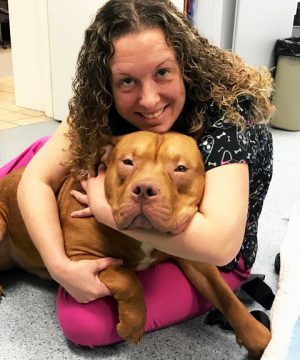
I am the shelter clinic manager at Capital Area Humane Society. I oversee the day-to-day running of the clinic to make sure we are functioning as efficiently as possible. Some of my duties include scheduling surgeries, preparing and anesthetizing patients for routine orchiectomy and ovarihysterectomy procedures, as well as leg and tail amputations, eye enucleations, dental prophylaxis, etc. I also maintain medical inventory for the entire shelter and order all our supplies. I am in charge of all clinic volunteers, and part of our amazing clinic staff.
Beyond that, I am part of the operations leadership team here at the shelter. It is a group of five and we discuss policies and overall shelter management—how to provide the best care for the animals and get them into forever homes.
My favorite part is truly all the animals I meet and help along the way. I have worked at the shelter for almost 12 years and have seen many things. The most mind-blowing thing is animals’ capacity to forgive and still love people. Like when I see “fight dogs” get a second chance at life and see them so happy and loving life; it is beautiful.
Nicole
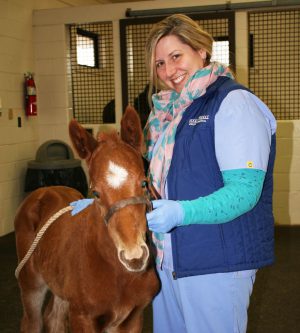
My current position is the surgery and anesthesia supervisor at Rood and Riddle Equine Hospital. I am responsible for overseeing and managing 15 surgery technicians, 4 anesthesia technicians, 6 recovery technicians, and 2 anesthesia interns. I coordinate with the surgeons and the anesthesiologist to maintain a safe and efficient day of anesthetizing up to 40 horses. I am also responsible for training all new anesthesia technicians, as well as our hospital interns, on the anesthesia service.
My favorite part about my current role is that I get to run anesthesia every day on some of the most impressive athletes—racehorses. It is something I truly enjoy. My favorite cases to anesthetize are neonates! They are such a welcomed challenge.
What Advice Would You Give to Future Veterinary Nurses?
Christine: I’d say find an area of the field you really enjoy, one that really challenges and motivates you. It’s true what they say: if you love what you do you never work a day in your life. So, find something you truly love that doesn’t feel like work.
Jennifer: Don’t be afraid to try new job opportunities. Not every job is right for every person, go explore and find your niche.
Nicole: The advice I’d give is stick with it even if it’s tough—you get out of it what you put in.
My Experience at MSU
Christine
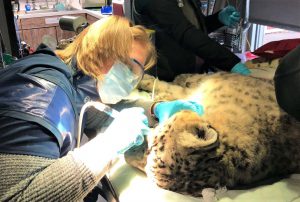
The Program gave me a lot of knowledge, resources, and experiences I could draw on when I went out into practice. It’s given me this foundation I can always look back on to compare with the newest updates and see what still works and what can be improved upon.
I had the opportunity to do two zoo rotations for my clinicals; it’s opportunities like that which help prepare future veterinary technicians and nurses for this field. The Program makes sure you are prepared for this line of work no matter which area you choose to practice in.
My favorite part of the Program is a draw between the hands-on training and all the lectures. Before I started the Program, I worked for Banfield Pet Hospital, and I never really understood all the protocols we followed until I was taking classes and it all finally clicked. I felt like I had a much greater understanding of why Banfield’s protocols were set up that way.
The Program makes sure you are prepared for this line of work no matter which area you choose to practice in.
The MSU Veterinary Technology Program is, frankly, awesome. The history speaks for itself and the teachers engage their students and make learning fun and interesting. It’s not just regurgitating facts and numbers—although that’s necessary at times. They want to make sure you fully understand before you practice.
It’s also amazing having the clinics right here at the College and you’re welcome to explore and observe. The clinicians also love teaching; they’re engaged and willing to share knowledge and excitement—that’s what makes the Program totally unique.
Jennifer
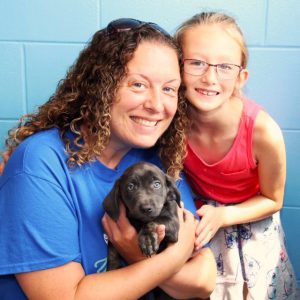
The Program helped me learn to always ask questions, double check everything (the five rights), and speak for animals that can’t speak for themselves. It gave me the initial knowledge base I needed to start working towards my career and the confidence to go out in the world and try new career paths. I had already seen private practice, then right out of the Program I was hired at MSU in radiology, then research, and finally the Capital Area Humane Society. I didn’t know I would find my niche in shelter medicine, but it truly is a calling and I couldn’t be happier.
I really enjoyed the closeness, the way your classmates and teachers were all there to support one another.
I really enjoyed the closeness, the way your classmates and teachers were all there to support one another. We would have as many hands-on opportunities as possible and study sessions all the time.
This Program can be tough, though extremely rewarding. The extensive knowledge and time these teachers provide for each student is amazing. They will push you to be the best of the best and will support you in any way they can while providing an amazing education.
Nicole
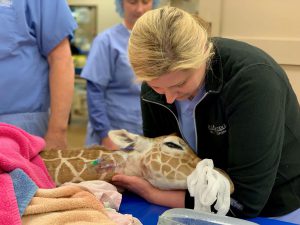
The Program made us work hard in every aspect. We were challenged both academically and technically. We were expected to be able to be just as proficient as the veterinary medical students in our knowledge and technical ability.
My favorite part was being on clinics. It really put what you learned in the classroom into perspective and it was fantastic to use and develop my technical skills. I was terrified of anesthesia in the class but once I got to clinics, I felt like I thrived. I really enjoyed seeing how the same drug could react differently based on each patient and species.
We were expected to be able to be just as proficient as the veterinary medical students in our knowledge and technical ability.
I would recommend it because I truly feel that we were prepared for life outside of academia. It prepared me for my position by helping to give me the knowledge that was so necessary, as well as providing me with the confidence to lead. The education I received from MSU is so incredibly invaluable. I had some of the best experiences there and wouldn’t trade it for the world.

